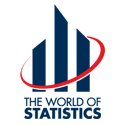Title: Bayesian Estimation of Trends in Population-Level Health Metrics Using Disparate Data Sources
- Speaker: Mariel Finucane, Mathematica Policy Research
- Chair: Donsig Jang
- Discussant: Daniell Toth, Bureau of Labor Statistics
- Date and Time: Wednesday, November 12th, 12:30 - 2:00 p.m.
- Location: Bureau of Labor Statistics Conference Center #9
To be placed on the seminar attendance list at the Bureau of Labor Statistics, you need to e-mail your name, affiliation, and seminar name to wss_seminar@bls.gov (underscore after 'wss') by noon at least 2 days in advance of the seminar, or call 202-691-7524 and leave a message. Bring a photo ID to the seminar. BLS is located at 2 Massachusetts Avenue, NE. Use the Red Line to Union Station. - Sponsors: WSS Methodology Section and WSS Public Heath and Biostatistics Section
- POC e-mail: mfinucane@mathematica-mpr.com
- WebEx event address for attendees: Go to https://dol.webex.com/dol/j.php?MTID=mfdc5b6d08d4d1480685f067714db3649
- For audio: Call-in toll-free number (Verizon): 1-866-747-9048 (US) Call-in number (Verizon): 1-517-233-2139 (US) Attendee access code: 938 454 2
- Note: Particular computer configurations might not be compatible with WebEx.
Materials
Abstract:
Rational priority setting in global health requires rigorous quantification of worldwide, population-level trends in health status. Because global-level surveys are not available, however, researchers are forced to rely on country-level and local data that are often sparse, fragmentary, or unreliable. We present a Bayesian model that addresses this problem by systematically combining data from disparate sources to make country-level estimates of trends in important health metrics for all nations. The model uses Markov random field methods to allow for nonlinear trends and a hierarchical structure to borrow strength within and across regional country clusters. MCMC sampling facilitates inference in a high-dimensional, constrained parameter space, while providing posterior draws that enable straightforward inference on the wide variety of functionals of interest. Throughout, the Bayesian approach accounts for uncertainty resulting from data missingness, as well as sampling and parameter uncertainty.
In this talk, I will present results for two example health metrics. First, I will discuss trends in hypertension, a primary risk factor for cardiovascular disease – the leading cause of death worldwide. I will then turn to malnutrition, an important contributor to childhood morbidity and mortality in low- income regions. As all levels of mild, moderate, and severe malnutrition are of clinical and public health importance, I will present an extension of the model that uses a finite normal mixture to estimate the shape of the distributions for markers of malnutrition. The model incorporates both individual-level data when available, as well as aggregated summary statistics from studies for which individual-level data could not be obtained.
This work addresses three important problems that often arise in the fields of public health surveillance and global health monitoring. First, data are always incomplete. Second, data from different sources are often incomparable. Third, standard techniques fail to provide estimates of the full distributions of health metrics, the tails of which are often of substantive interest.






